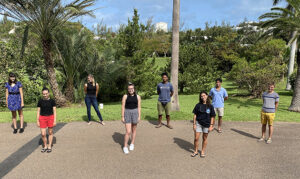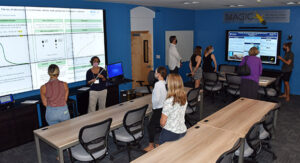Snorkeling, Writing Practice, and Greek Dancing

This month, eight students from various U.S. universities completed the National Science Foundation Research Experiences for Undergraduates (REU) program at BIOS. Attendees included (back row, from left) Gaile Greene, Shannon Lemieux, Jerry Goss, Jacob Ancri, and Adam Shaham. In the front row (from left) are Nicole Adamson, Cali Grincavitch, and Natalia Padillo-Anthemides.
The university student interns at BIOS this fall knew there would be a lot to learn during three months of intense marine and atmospheric science instruction at BIOS. But a Greek dancing lesson was an unexpected surprise.
Each fall since 1991, the National Science Foundation Research Experiences for Undergraduates (REU) program has brought U.S. undergraduate students to BIOS for mentor-guided independent research projects on a variety of topics, including marine biology, environmental chemistry, physics, coral reef ecosystems, and climate change. Activities outside the classroom and lab traditionally center around the history and culture of Bermuda, including a snorkel trip to a coral reef and a field trip to Walsingham Nature Reserve to learn about geology, cave formation, and mangrove habitats.
Scheduled social activities are optional, but typically well-attended; nearly the entire REU class plus several other students on campus showed up for Natalia Padillo-Anthemides’s dance instruction (followed by snacking on dolmades, feta cheese, and Greek olives).
Padillo-Anthemides, a marine biology student from Florida International University and president of her school’s Greek American Student Association, organized the evening’s event.
“One day when we were all jumping off the floating dock, I started Greek dancing, just bursting from happiness and gratefulness at being here and being surrounded by warm people, and my fellow REUs expressed interest in following along,” she said. Several days later, she hosted evening dance lessons on a BIOS campus lawn.

During their internship at BIOS, REU students learned how to compose and produce scientific posters describing their work, which is compatible with the requirements for presenting at national or international conferences. A formal virtual presentation session is then held for the wider BIOS community to view the posters and discuss them with the REU students. “These efforts to teach and improve science communication skills are clearly effective,” said Samantha de Putron, assistant director of University Programs at BIOS. “A number of BIOS REU students have gone on to present their research at a range of conferences.”
The 29-year-old REU program at BIOS follows a similar itinerary each year and is modified annually based on student and instructor evaluations, said Samantha de Putron, assistant director of University Programs at BIOS. Administrators also adapt the program as it progresses each fall, such as when guest scientists visiting the BIOS campus provide a lecture on a special topic (or when students bring in their own ideas for special activities in their down time).
This year, the REU program was also adapted to meet the challenges of the global health pandemic. Students began the program virtually in late August and were not permitted in restricted areas on campus, such as labs and offices, until their day 4 negative Covid test result. They also were not allowed in any group meetings until their day 8 negative test result.
Ship quarantine protocol canceled one highly-anticipated REU field trip: a multi-day research cruise aboard the BIOS-operated vessel Atlantic Explorer to the deep-water research mooring Hydrostation ‘S’, site of the world’s longest-running time-series for oceanographic data.
But other components of the traditional program were modified. A field trip to Nonsuch Island, part of a nature reserve that can be visited by permit only, was revised after the island closed during the pandemic. The island is considered the most important site in Bermuda for the conservation of rare and threatened endemic species and habitats, which the students were able to discuss after snorkeling on a nearby shipwreck. During the trip, Roger Williams University marine biology student Gaile Greene spotted multiple lionfish, which are invasive in Bermuda and threaten the ecosystem by consuming multitudes of juvenile marine fish species.
“I had the pleasure of watching one of the BIOS staff members capture two lionfish,” Greene said. “Later, they even gave the fish to the kitchen so we could taste them.”
Presenting science on social media, performing community outreach, learning about science writing for a public audience, and designing science posters were also topics covered during the program.
“The scientific writing workshop could have been just a very basic overview of proposals and how writing works in the scientific world, however (BIOS zooplankton ecologist) Amy Maas brought the workshop to a whole different level by sharing her personal experiences and giving us tips and tricks that she has learned over the years,” said Shannon Lemieux, a fisheries and wildlife student from Oregon State University. “I gained insight into successful writing techniques, not just basic knowledge.”
BIOS science writer and research technician Ali Hochberg offered similar tools with her presentation on writing about science for a public audience. “She gave us personal anecdotes and reasons behind why things need to be written a certain way,” Lemieux said. “Ali also made the workshop personal to each REU by having us craft our own personal biographies and research summaries.”
The interns know they are unique among their collegiate peers this year, enjoying field trips to mangroves and marine caves while many students across the United States watch Zoom classes from dorm rooms or their parents’ homes. When asked which activity most appealed, Cali Grincavitch, a biology student at Harvard University, pointed to a classic Bermuda experience that can’t be replicated on a Zoom call or experienced sitting in a classroom: snorkeling on a coral reef.
“Just floating above such an immense, gorgeous reef made me so grateful for this opportunity,” Grincavitch said. “We are beyond lucky to do research in such a beautiful place and work to protect these ecosystems.”
